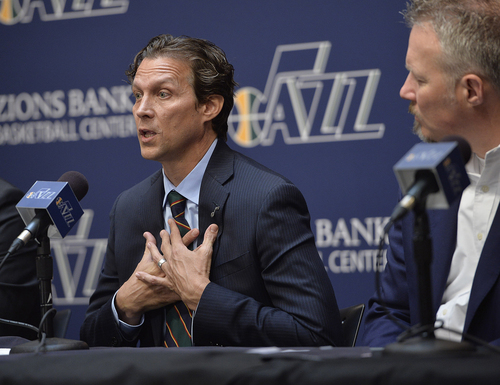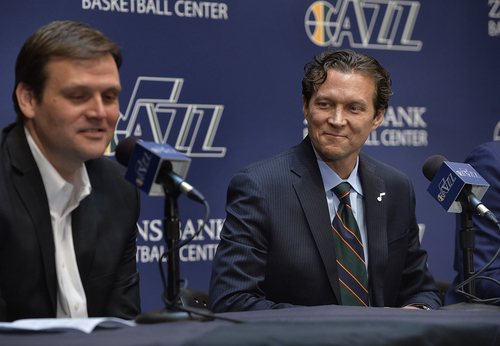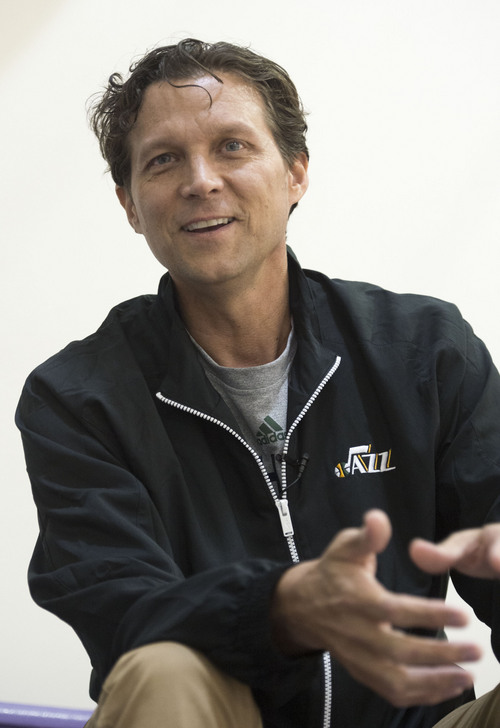This is an archived article that was published on sltrib.com in 2014, and information in the article may be outdated. It is provided only for personal research purposes and may not be reprinted.
The new face of the Utah Jazz doesn't yet know how to get inside EnergySolutions Arena. He's still living out of a suitcase, traveling back and forth across the country, from his old life in Atlanta to his new one in Salt Lake City.
This is the sixth job he's had in the last five years, all part of a journey that has seen him go from being one of the hottest young college basketball coaches in the country, to the grind of the Development League, and finally to a top job in the world's top basketball league.
It's been just over a week since Snyder was introduced as the team's new head coach, the eighth man to hold the title in team history. But Quin Snyder already exudes a cool confidence that he can help restore the franchise to its former glory.
This week, Snyder sat down with The Salt Lake Tribune to discuss his plans for the rebuilding Jazz, his coaching philosophies, and his plans to get Utah back to winning.
Tribune: How are you settling in to Salt Lake?
Snyder: It's going fast. As you guys know, I kept you waiting a little today, which I apologize for. We were watching film of guys we're looking at in the draft. We've had a few [Jazz] players in the gym. It's good for me to have a chance to see guys face to face. I've been at draft workouts. Going around looking at homes, trying to get familiar with Salt Lake. I got lost today on my way to PF Changs. I know how to get from the hotel to the practice facility. I know where the arena is, but I don't know where the entrance is yet.
Tribune: Are you starting to get recognized around town?
Snyder: A couple times in the airport. I've flown back and forth a couple times. On a flight from Atlanta to Salt Lake there were a few Jazz fans on the plane. It's been fun. You can tell how much enthusiasm there is in the community for the Jazz.
Tribune: You were a candidate for other NBA head coaching jobs before this. It was reported that you pulled out of the pool in Orlando a few years back. What was different about this time and this job that you were committed to it?
Snyder: I was fortunate enough for some people to consider me. I don't know there was a job that I was going to get. But the experience I had going to Russia was one that prepared me even more for coaching. I think I mentioned in our introductory press conference that my wife went to grad school up in Logan, at Utah State. When you look at the NBA, there are only 30 cities. So you look at places that are attractive to you. Not just the team, but the community, the weather, the mountains. So when Dennis called, I was obviously really excited. It's a team I can hopefully do a good job coaching. We've got young guys. That's a challenge. We've got work to do. But I think it will be a good chance for us to all grow up.
Tribune: Some [current Jazz] players have come into the facility to workout, but are you reaching out to the rest? How do you start building that relationship with your players?
Snyder: Obviously the beginning is just an introduction. Hey. Hello. I'm Quin Snyder. I'm your coach. Some of the guys I've been able to catch up with on the phone. Others I've been able to text and trade a couple messages with. That process, there's an introductory point, but trust takes time. Players, coaches, people, you have to have some faith and trust and then it has to be earned. It's more about what you do than what you say.
Tribune: This is a really young team and there's been a lot of talk about your abilities as a player development guy. Where does that part of your skill set come from?
Snyder: As an old college coach, that was something that you were really focused on. It's become kind of something that everybody talks about, everybody wants to do. I think a couple things that are key is your staff has to be really, really good. You have to be teachers. You have to enjoy seeing guys improve. We're awfully young. You're going to see a lot of guys grow. Hopefully some will grow pretty fast. It's a challenge, but it can be really rewarding as well when you see people get better.
Tribune: I know DeMarre Carroll [a former Jazz forward who was with Snyder last year in Atlanta] really praised your efforts with him this season.
Snyder: He's a lot of fun. We spent a lot of time together. He probably got sick of me. I definitely got sick of him. No, that relationship, to your point, that's what I enjoy about it. He felt like his game had an opportunity to improve. Truthfully, at the beginning of the year, I didn't think he was a great finisher around the rim and he did some things to be able to improve that. He's got a little floater game, kind of like a guard would have. He's interesting because he picks stuff up so quickly. There are some guys you show them something and it's like, 'OK. I got it.' And he's hungry to learn. He sent me a video clip the other day of him working on his ball handling.
Tribune: Will your offense look like what you did in Austin and what the Hawks ran last season? Or will your try a different look here?
Snyder: When I was in the D-League, one of the things we were asked to do, and I wanted to do, is to run a form of motion, which is essentially what you see in San Antonio. There's so much ball movement and they're such a good passing team, obviously we weren't going to replicate that. But I think the system there has adjusted to their personnel. As Tim Duncan has moved away from the basket and become even more effective on the perimeter, there are different things they'll do to take advantage of their personnel. We didn't have that personnel in the D-League. It's a little different. And when we were in Atlanta we had different personnel. We had one primarily pick-and-roll player with Jeff Teague. With our team, I see a number of guys who can play in pick and roll. I think Gordon [Hayward] can. I think Alec [Burks] can. I think we've got a good opportunity to do some pick and roll.
Tribune: How have your systems and philosophies evolved over the years?
Snyder: When I got the job at Missouri, having been at Duke for most of my adult life, the way we played a was lot about spacing. We had really good guards who could drive the ball and some great shooters. When I got to Missouri, my first year we had some of the same qualities. Then we got more big guys. It was an adjustment for me learning how to adapt a system to size and having two bigs on the court. Last year in Atlanta, we played a very spread offense. We had fives that could space the floor. Sometimes, we put five shooters around the perimeter. Every team is different. Really, every lineup is different. The challenge for us this year is to try to utilize our players the best we can. That's something about the D-League that was really valuable. You'd have a team and you figure you're playing a certain way. The next day, two of your guys would be gone and you'd have to figure out how to make those adjustments.
Tribune: Speaking of playing multiple bigs together, there was an ongoing storyline last season about whether Enes Kanter and Derrick Favors could play together on the floor. Have you seen enough of them to have an opinion?
Snyder: It's hard sometimes for bigs to play together when they're both kind of playing the same role. So they've got to adjust. We've got to adjust a little bit as far as how we want to use them. That's really something we'll talk about this summer. Really, my job is to put guys in the best position to succeed. Once we make those decisions, then they've got to work and they've got to work hard to make those plays. From what I've seen from both of those guys, that's something they'll do.
Tribune: Now that you've had a couple of weeks to evaluate, are there gaps on this roster that need to be addressed to run the system you want to run?
Snyder: I think you can look at that a couple ways. I think those gaps can be opportunities. I think Trey [Burke] is a great example. The things he's done on the court as a rookie, there's obviously opportunity to improve. He was on the All-Rookie team last year. That's great, but we want him to work on things. We want to see him grow as a leader. There's a lot of things as a defender he needs to do. There are opportunities for players to improve. Our team needs to be better defensively. But I'd prefer to look at them as opportunities rather than holes. And where they exist, we have to put in a lot of work.
Tribune: Does this team have enough shooting to space the floor the way you did in Atlanta?
Snyder: You don't really know all the time until guys feel your confidence as a coach. Sometimes you have to give them confidence before they've earned it, so to say. We've got some guys that can shoot the ball, absolutely. A few other guys who can play out on the perimeter. It may not be shooting the ball as much, but maybe making players out there. But you can always use more shooting.
Tribune: There has been a lot said of your past and there's this ongoing redemption storyline. What do you think of that? Did you feel you needed to be redeemed as a coach at any point?
Snyder: All I know is there are challenges you have throughout your life. I had a few of them were things that made me consider where I was, what I was doing, did I want to keep coaching. And it helped me. There's no question that I'm a better coach today than I would be if I hadn't gone through various steps in a coaching career.
Tribune: Is it true at one point you ended up crashing on Doug Collins' couch?
Snyder: He was kind enough to take me in. I was a wayward young guy. He said come on over. We went to Subway every day at noon.
Tribune: You've worked with some legendary coaches, but how much have you learned along the way from players?
Snyder: A ton. Kobe probably coached me more than I coached him. I think great players, my experience is they have respect for you if you put in the time and work and can help them. One of the big misconception about the NBA is that players don't' want to be coached. There are always some guys that don't necessarily want that or make it harder, but I think the best players ofent will allow you to coach them and want to be coached. I learned a ton from Kobe when he was hurt because he sat next to me on the bench. We had a good dialogue. He probably knows more basketball than I do.
Tribune: What do you want the legacy of your tenure as Jazz coach to be? What do you want people to say about your teams in five, 10 years?
Snyder: I think that our team improved. That we got better every game, every year. That's the most you can ask of a group, is to maximize what you have. One of the things about this organization is they play unbelievably hard. Coach Sloan was in the gym today. He personified that competitiveness. I would like our teams to play hard, for people to say we competed. And the other big thing for me is that we are unselfish. That we were able to put the team and club ahead of ourselves individually. Hopefully, that will be a brand of basketball that people can appreciate.
Tribune: Are you getting much feedback from Sloan?
Snyder: I just got here. I just got the chance to meet him. But I hope to learn from a lot of people, Coach Sloan certainly among them.
Tribune: This team won 25 games last year. Is there a timeline in your mind, check points for success from one year to the next?
Snyder: You want to have it as quickly as you can. But it's really important not to skip steps along the way. We don't want to sacrifice kind of long-term success for anything short term. And that's harder. That may mean having a younger team and kind of having some growing pains. Winning a few games and losing a few that we think we should win but we're not experienced enough. We need to be better. I need to be better. But in the end, I think that's the right way to approach it. I hope to be here a long time. If I'm not here as long, you want the team and club to be a better place than when you started.
Twitter: @tribjazz









